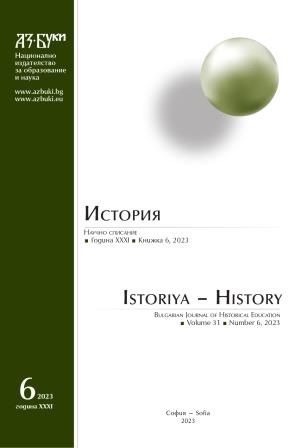The Value of Historical Knowledge for the Modern World
The Value of Historical Knowledge for the Modern World
Author(s): Svitlana HanabaSubject(s): History, Cultural history, Comparative history, Diplomatic history, Economic history, History of ideas, Political history, Recent History (1900 till today), Present Times (2010 - today)
Published by: Национално издателство за образование и наука „Аз-буки“
Keywords: istory; historical education; experience of the past; values; modernity; knowledge
Summary/Abstract: The purpose of the article is to understand the lessons of history from the standpoint of human values and to emphasize the heritage of the past as a social resource capable of fostering understanding, tolerance, complicity and contributing to the solution of contemporary social problems. The methodological basis is the use of socio-philosophical analysis to characterize the historical process as the interaction of two principles: objectively determined and subjectively volitional. The axiological approach helped to analyse the educational potential of history in the modern world practices and to present education as a space of freedom in a person’s self-development. The scholar underlines that the change of historical eras causes a change in the established system of values. It is about the process of revaluation and the value system ‘creation’. No historical fact can be explained and evaluated beyond its historical time. The understanding of the past including its value system in the realities of the modern world determines the understanding of a person as a development system, which is carried out on the basis of the cultural-historical experience of a particular society. The formation of a new system of values and moral-ethical priorities of each historical era does not occur from scratch. The universal human virtues tested by time and sanctified by history serve as a basis for revising and creating worldview and value standards of a specific historical era. They appear to be a spiritual capital of humanity, accumulated over millennia, which will never depreciate, but on the contrary, will gain more value. The reference point in all historical processes is a person. The person is considered to be an active agent of history, who does not create his life under the influence of objective laws and external factors, but who combines his own intentions with the worldview and value orientations of his time. The basis of the historical reality manifestation is determined by the multifaceted nature of human existence. A picture of the past is created from small particles of historical events, individual touches, memories, a mosaic set of human perception of the world, which is more reliable, because it carries the ‘human spirit’. The focus of the scholar’s attention is the world of the unique and unrepeatable, and not the general and theoretically modelled one. Education built on the intentions of tolerance is designed to contribute to the formation of an individual capable of caring about the universal pain of human problems, to cultivate involvement as an important component of worldview mobility.
Journal: История
- Issue Year: 31/2023
- Issue No: 6
- Page Range: 572-586
- Page Count: 15
- Language: English
- Content File-PDF

